|
|
|
Sort Order |
|
|
|
Items / Page
|
|
|
|
|
|
|
| Srl | Item |
| 1 |
ID:
130702
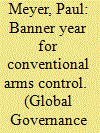

|
|
|
|
|
| Publication |
2014.
|
| Summary/Abstract |
THE CONTROL OF CONVENTIONAL ARMS HAS OFTEN SEEMED THE POOR COUSIN of the global efforts to control weapons of mass destruction (WMD). Since the advent of the atomic era, the focus of arms control and disarmament activity has been overwhelmingly on nuclear weapons and their lesser, if still ugly, stepsisters of biological and chemical weapons. The initial multilateral arms control agreements concerned themselves with limits on the testing of nuclear weapons and, shortly thereafter, with their nonproliferation (e.g., the Nuclear Nonproliferation Treaty of 1968). Bilateral US-Soviet/Russian arms control arrangements also predominantly dealt with the reduction of strategic nuclear forces and restraints on deployments of defenses against (nuclear tipped) ballistic missiles. Efforts to reduce major conventional weapon systems were also taken up in the 1980s in the context of negotiations
between the opposing alliances of NATO and the Warsaw Pact, eventually culminating in the Treaty on Conventional Forces in Europe (CFE Treaty) of 1989. This treaty provided for a massive reduction in the conventional forces that had confronted each other for years in Central Europe and established a new, far more stable security order on the continent. Even the CFE Treaty, however, tended to be overshadowed by other major disarmament agreements concluded in those heady post-Cold War days: the Intermediate Nuclear Forces Treaty (1987), Chemical Weapons Convention (1993), Comprehensive (Nuclear) Test Ban Treaty (1996), and various US-Russian bilateral strategic nuclear arms accords of the 1990s and early 2000s (e.g., the Strategic Arms Reduction Treaty and the Strategic Offensive Reductions Treaty).
|
|
|
|
|
|
|
|
|
|
|
|
|
|
|
|
| 2 |
ID:
125448
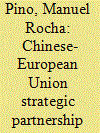

|
|
|
|
|
| Publication |
2013.
|
| Summary/Abstract |
The people's republic of China and the European Union (EU) have designed different projects for their inclusion into the international system. However the contrast among the different meaning that each actor gives to concepts like sovereignty, global security, human right or multilateralism has not been an obstacle to establish cooperation nexuses.
|
|
|
|
|
|
|
|
|
|
|
|
|
|
|
|
| 3 |
ID:
131062
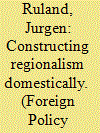

|
|
|
|
|
| Publication |
2014.
|
| Summary/Abstract |
There is a dearth of studies exploring the construction of ideas on regionalism outside Europe. This article seeks to make a contribution to close this gap. It examines the construction of ideas on regionalism in Indonesia, the largest member country of the Association of Southeast Asian Nations (ASEAN). Theoretically, the paper draws from Acharya's concept of "constitutive localization" which it develops further. It offers an alternative explanation to studies which argue that as a result of mimetic behavior, social learning, and cost-benefit calculations, regional organizations across the world become increasingly similar. While this may be the case in terms of rhetoric and organizational structure, it is not necessarily the case at a normative level. The Indonesian case shows that even though foreign policy stakeholders have increasingly championed European ideas of regional integration after the Asian Financial Crisis of 1997/1998, they have skillfully amalgamated them with older local worldviews through framing, grafting, and pruning. European ideas of regional integration thereby served to modernize and relegitimize a foreign policy agenda which seeks to establish Indonesia as a regional leader with ambitions to play a major role in global politics.
|
|
|
|
|
|
|
|
|
|
|
|
|
|
|
|
| 4 |
ID:
131018
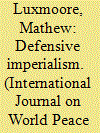

|
|
|
|
|
| Publication |
2014.
|
| Summary/Abstract |
This article examines Russia's approach to the post-Soviet space in relation to domestic stability during
I'utin's first two terms. It identi?es three dimensions of security which underpinned foreign policy during
this period-ideological, economic, and mi1itary~and demonstrates how each interacted with policies on the domestic front. Assessing Rnssia's response to Ukraine's Orange Revolution, it shows how the events of 2004 initiated a shift towards insulation from perceived external threats to political stability. A policy of "defensive imperialism" emerged whereby offensive actions abroad were aimed fundamentally at facilitating a stable external environment to politically safeguard the regime. The article concludes with a brief assessment of developments since 2008, and offers a pessimistic prognosis of the impact this trend will have on Russia's domestic stability and its international relations.
|
|
|
|
|
|
|
|
|
|
|
|
|
|
|
|
| 5 |
ID:
131060
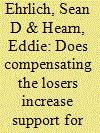

|
|
|
|
|
| Publication |
2014.
|
| Summary/Abstract |
The political economy of trade literature argues that compensating those who lose from trade is an important component of maintaining public support for free trade, a linkage known as the compensation hypothesis or embedded liberalism thesis. Previous research has found support for many elements of the causal chain underlying embedded liberalism; however, there has been little research on the most crucial element of the causal chain, namely that compensation policies lead to increased support for trade. This article provides a direct test of the compensation hypothesis using a survey-based experiment conducted in the United States that exposes half of the respondents to knowledge of compensation programs and then asks for their opinion on trade policy. The article explores whether knowledge of compensation increases support for trade as well as who is influenced by this knowledge and, thus, provides a crucial test of the embedded liberalism thesis.
|
|
|
|
|
|
|
|
|
|
|
|
|
|
|
|
| 6 |
ID:
086814
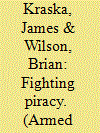

|
|
|
|
|
| Publication |
2009.
|
| Summary/Abstract |
Maritime piracy has experienced a renaissance not seen since the period of the Barbary pirates. Last year, more than 80 ships were hijacked off the dangerous waters of Somalia, and the ransom for some vessels fetches several million dollars.
|
|
|
|
|
|
|
|
|
|
|
|
|
|
|
|
| 7 |
ID:
131498
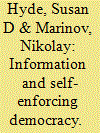

|
|
|
|
|
| Publication |
2014.
|
| Summary/Abstract |
This article argues that when democracy is not yet institutionalized, leaders have little incentive to push for clean elections, in part because they are likely to face accusations of fraud from domestic opposition groups regardless of their true behavior. Reputable international election observers can facilitate self-enforcing democracy by providing credible information about the quality of elections, thus increasing citizens' ability to coordinate against the regime when election fraud occurs, and discrediting "sore loser" protests. Patterns of postelection protests are consistent with the argument, including that postelection protests are more likely and last longer following negative reports from international observers. International election observers help promote democracy by making postelection protest more accurate in the short term, thereby increasing incentives for leaders to hold democratic elections in the long term.
|
|
|
|
|
|
|
|
|
|
|
|
|
|
|
|
| 8 |
ID:
126256
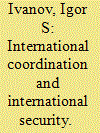

|
|
|
| 9 |
ID:
126254
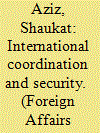

|
|
|
| 10 |
ID:
068696
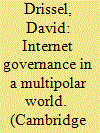

|
|
|
| 11 |
ID:
129109
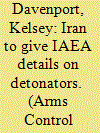

|
|
|
|
|
| Publication |
2014.
|
| Summary/Abstract |
Iran will provide the International Atomic Energy Agency (IAEA) with information about its past development of a detonator that could be used to as a trigger in nuclear weapons, according to an agreement reached by the two sides last month. In a Feb. 9 joint statement, Iran and the IAEA described the two days of talks in Tehran as "constructive" and announced seven actions for Iran to take by May 15 to further the agency's investigations into its unresolved concerns about Iran's current nuclear program and past actions. One of the actions requires Tehran to provide the IAEA with information on exploding bridge wire detonators, which can be used to trigger nuclear weapons. They can also be used in civilian applications, including drilling for oil and gas, and for conventional military explosives.
|
|
|
|
|
|
|
|
|
|
|
|
|
|
|
|
| 12 |
ID:
129108
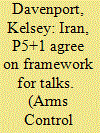

|
|
|
|
|
| Publication |
2014.
|
| Summary/Abstract |
After three days of talks in Vienna, Iran and six world powers agreed last month on a framework and timetable to guide the first four months of negotiations on a comprehensive deal on Iran's nuclear program. EU foreign policy chief Catherine Ashton, who leads the negotiating team for the six-country group known as the P5+1 (China, France, Germany, Russia, the United Kingdom, and the United States), said in a Feb. 20 statement that the parties had "identified all of the issues" to be addressed in the comprehensive agreement. An official who was briefed on the talks told Arms Control Today in a Feb. 20 e-mail that this is not a "written agenda" but an "understanding of the issues that must be covered." The official, who is from a P5+1 country, said that most of the discussions were on process but that "some substance was covered." The Feb. 18-20 meetings marked the resumption of political-level negotiations between Iran and the P5+1, following a Nov. 24 agreement on a plan of action, which laid out initial steps for each side to take and the broad parameters to guide negotiations on the comprehensive deal. (See ACT, December 2013.)
|
|
|
|
|
|
|
|
|
|
|
|
|
|
|
|
| 13 |
ID:
129119
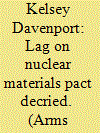

|
|
|
|
|
| Publication |
2014.
|
| Summary/Abstract |
The failure of several key states to ratify a nuclear security treaty ahead of this month's nuclear security summit is a disappointment, but an Indonesian initiative may increase the pace of ratifications, an official familiar with the preparations for the meeting said. The two previous nuclear security summits, in Washington in 2010 and Seoul in 2012, have emphasized the importance of the entry into force of a 2005 amendment to the Convention on the Physical Protection of Nuclear Material (CPPNM). The March 24-25 summit in The Hague is also likely to encourage ratification of this treaty. The original treaty, which entered into force in 1987, sets security standards for nuclear material in transit. Its 2005 amendment would expand the scope of the physical protection measures to cover material in storage. An additional 26 ratifications are necessary to reach the 98 necessary for bringing the amendment into force. Although the 2012 Seoul summit communiqué urged states "in a position to do so to accelerate their domestic approval" of the amendment in order to achieve entry into force by 2014, 17 of the 53 summit participants have yet to ratify it
|
|
|
|
|
|
|
|
|
|
|
|
|
|
|
|
| 14 |
ID:
127075
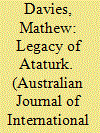

|
|
|
|
|
| Publication |
2013.
|
| Summary/Abstract |
There exists a significant and sustained difference between the ability of the European Union to successfully socialise those member states who have joined since the fall of Communism, and its apparent inability to similarly socialise Turkey. Despite some impressive legal and constitutional reforms since 2001, a key shortcoming remains, the unwillingness of many in the Turkish judiciary to implement those revised standards in a consistent way. Existing explanatory accounts of this inability would focus on the credibility of the Union offer of membership, the duration of negotiations or the importance of Turkish domestic standards. None of these, however, are able to account for why Turkey seems to occupy a half way position, exhibiting reformed laws but unreformed legal practice. To address this shortcoming this article shall combine existing scholarship on the importance of domestic normative contestation within Turkey with an appraisal of the shortcomings of the Union's conditionality policy itself that emerge from the conceptual studies of conditionality.
|
|
|
|
|
|
|
|
|
|
|
|
|
|
|
|
| 15 |
ID:
127073
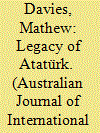

|
|
|
|
|
| Summary/Abstract |
There exists a significant and sustained difference between the ability of the European Union to successfully socialise those member states who have joined since the fall of Communism, and its apparent inability to similarly socialise Turkey. Despite some impressive legal and constitutional reforms since 2001, a key shortcoming remains, the unwillingness of many in the Turkish judiciary to implement those revised standards in a consistent way. Existing explanatory accounts of this inability would focus on the credibility of the Union offer of membership, the duration of negotiations or the importance of Turkish domestic standards. None of these, however, are able to account for why Turkey seems to occupy a half way position, exhibiting reformed laws but unreformed legal practice. To address this shortcoming this article shall combine existing scholarship on the importance of domestic normative contestation within Turkey with an appraisal of the shortcomings of the Union's conditionality policy itself that emerge from the conceptual studies of conditionality.
|
|
|
|
|
|
|
|
|
|
|
|
|
|
|
|
| 16 |
ID:
129126
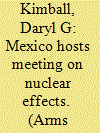

|
|
|
|
|
| Publication |
2014.
|
| Summary/Abstract |
For the second time in two years, diplomats and civil society representatives gathered last month for a two-day conference on the medical and societal impacts of nuclear weapons use, with many governments calling for "new international standards and norms, through a legally binding instrument," according to the chair's summary of the meeting. The agenda of the Feb. 13-14 conference in Nayarit, Mexico, included several presentations from survivors of the Hiroshima and Nagasaki bombings and from experts on the effects of and responses to single nuclear detonations and large-scale nuclear attacks. "It is a fact that no State or international organization has the capacity to address or provide the short- and long-term humanitarian assistance and protection needed in case of a nuclear weapon explosion," concluded Juan Gómez Robledo, conference chair and undersecretary for multilateral affairs and human rights in the Mexican Foreign Ministry. The Nayarit gathering brought together 146 government representatives-more than the 127 that met in Oslo, Norway, in March 2013 for the first such conference.
|
|
|
|
|
|
|
|
|
|
|
|
|
|
|
|
| 17 |
ID:
129133
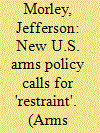

|
|
|
|
|
| Publication |
2014.
|
| Summary/Abstract |
The Obama administration in January announced a new policy on conventional arms transfers that emphasizes the need for restraint in considering transfers that might endanger regional security or human rights. President Barack Obama declared in a Jan. 15 directive that the new policy "supports transfers that meet legitimate security requirements of our allies and partners in support of our national security and foreign policy interests" and "promotes restraint" in those "that may be destabilizing or dangerous to international peace and security." The policy, which replaces a 1995 directive issued by President Bill Clinton, follows the administration's announcement last October that it was loosening rules on the sale of U.S.-made weapons overseas. The reforms announced last fall are part of an effort that the administration says will tighten controls on the sale of the most dangerous arms while enhancing commerce in defense material and services that are not threatening.
|
|
|
|
|
|
|
|
|
|
|
|
|
|
|
|
| 18 |
ID:
139197
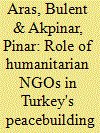

|
|
|
|
|
| Summary/Abstract |
This article illuminates the role of international HNGOs in Turkey's peacebuilding. Turkish HNGOs pursue low-level peacebuilding, focusing on interaction with grassroots, as opposed to the high-level peacebuilding of the state based on official interaction. Despite being independent, at times they become subsumed by the discourse, priorities and policies of the government and develop an interest in shaping official policies which carry the risk of politicizing the aid. While some of their key features such as flexibility, absence of conditionality, ensuring sustainability, relying on private donations and pursuing advocacy follow the mainstream peacebuilding lines, others such as culture and religion as catalysts and representing and promoting Turkey abroad demonstrate a deviation. Although the institutional consolidation of these HNGOs as a sector remains a distant goal, they are not likely to disappear given the considerable societal and political will behind their work. Their success depends on building a comprehensive strategy with efficient coordination and cooperation in a pluralist environment.
|
|
|
|
|
|
|
|
|
|
|
|
|
|
|
|
| 19 |
ID:
129110
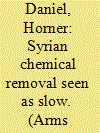

|
|
|
|
|
| Publication |
2014.
|
| Summary/Abstract |
Amid increasing frustration over the pace of Syria's removal of chemical weapons materials for overseas destruction, Syrian authorities are in talks with key countries and experts from the Organisation for the Prohibition of Chemical Weapons (OPCW) and the United Nations on a revised timetable for the removal effort, according to media reports and spokesmen for some of the parties in the negotiations. Syria has proposed a timetable that would take until about the end of May, but the U.S. government "believes that the Syrians are more than capable of moving these chemicals to Latakia on a shorter timetable," a State Department spokesman said in a Feb. 28 e-mail to Arms Control Today. Latakia is the port city in northwestern Syria where the Syrian government is collecting the chemicals from across the country before sending them overseas for destruction.
|
|
|
|
|
|
|
|
|
|
|
|
|
|
|
|
| 20 |
ID:
121036
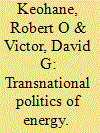

|
|
|
|
|
| Publication |
2013.
|
| Summary/Abstract |
Creating effective energy policy is hard, in part because it often requires effective international coordination. For most salient energy-related issues - such as control of the emissions that cause global climate change or the building of stockpiles to make oil supplies more secure - international coordination is inherently difficult. Solutions lie in making these problems more manageable by working in small groups of relevant countries; successful cooperation also hinges on finding incentive-compatible commitments that align, to the extent feasible, with national interests and are focused on areas where cooperation will yield tangible joint gains. The outcomes of such cooperation efforts are likely to be decentralized complexes of networked institutions rather than integrated, hierarchical treaties that govern a coherently defined issue-area.
|
|
|
|
|
|
|
|
|
|
|
|
|
|
|
|
|
|
|
|
|